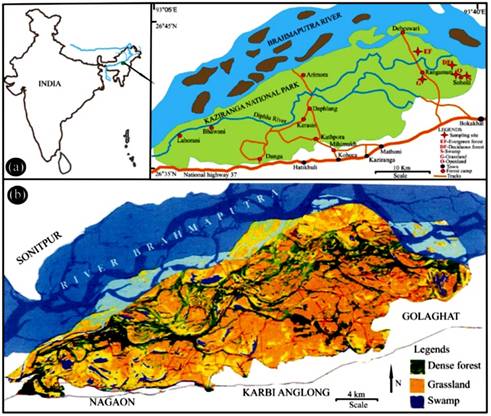Guwahati: In a significant scientific endeavor, researchers from the Birbal Sahni Institute of Palaeosciences (BSIP) have unveiled a modern analogue dataset designed for pollen and non-pollen palynomorphs (NPPs) in Kaziranga National Park (KNP), Assam. This innovative dataset holds the potential to unravel the mysteries of past vegetation and climate patterns in the region, offering valuable insights for biodiversity conservation and climate change assessment.
Climate change poses dynamic challenges, leading to periodic shifts in vegetation patterns. National parks, acting as bastions for biodiversity, face the impacts of extreme weather conditions and an increasing frequency of natural disasters. Amid these challenges, precision in future climatic assessments becomes crucial, necessitating robust climate models built on modern and historical climatic data.
Kaziranga National Park, nestled in Assam, serves as a vital corridor for the immigration of Indo-Malayan fauna into the Indian sub-region. Recognized for its critical role in preserving tropical species, especially during glacial periods, the park stands as a gene reservoir for diverse taxa.
The researchers at BSIP recognized the need for a precise tool to decode the past vegetation and climate dynamics of Kaziranga National Park. To address this, they developed a modern analogue dataset based on pollen and NPPs across diverse vegetation settings within the park. The study aims to evaluate the strengths and weaknesses of this biotic proxy, assessing its reliability in identifying different ecological environments. This dataset serves as a baseline for interpreting Late Quaternary palaeo-environmental and ecological changes more accurately in the region.
The high precipitation tropical region of Kaziranga demands a robust modern pollen analogue for deciphering past and future climatic scenarios. The palaeo-ecological data generated through this research promises a better understanding of sustainable future projections in and around the national park.
The combination of pollen and NPP data enhances the richness of information derived from palaeo-environmental reconstructions. This research, presented as the first holistic approach towards developing a modern pollen and NPP analogue, acts as a precise reference tool for herbivory and ecological studies in the tropical region of northeast India.
Published in the journal Holocene, the study introduces marker pollen taxa recovered from surface soil samples, providing insights into different vegetation and land-use patterns within Kaziranga National Park. The implications of this research extend to public and wildlife management agencies, aiding in the conservation of flora and fauna, especially herbivores, and aligning with the goals of the National Biodiversity Mission.
As climate change continues to reshape ecosystems, initiatives like the modern analogue dataset for Kaziranga National Park become invaluable tools, guiding conservation efforts and fostering a deeper understanding of our natural heritage. The research not only decodes the past but also contributes to shaping a sustainable future for this biodiverse haven.





